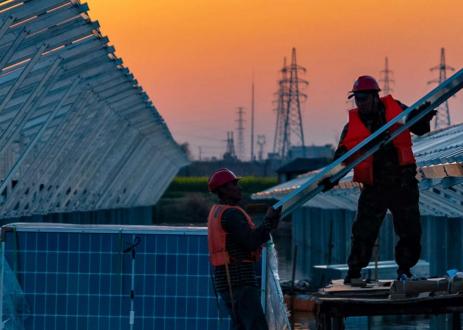
Making China'sInvestment Sustainable
WRI aims to help China and the world achieve carbon peaking and net-zero goals through climate-conscious investments.
Our Challenge
China has great opportunities to align its energy infrastructure investment with the urgency of the climate crisis and has pledged to peak CO2 emissions before 2030 and achieve carbon neutrality before 2060. To achieve its carbon goals, deeper efforts are needed to disentangle current investment and financial policy frameworks and economic interests from high-carbon activities.
Lower carbon dioxide emissions per unit of GDP by over 65% from 2005 levels.
Raise the share of non-fossil energy in primary energy use to around 25%.
Bring the total installed capacity of wind and solar electricity to more than 1.2 billion kilowatts.
Our Approach
The WRI Sustainable Investment Program works with a global network of Chinese and international thinktanks and research institutes in renewable energy and green finance, among other fields. The program aims to track China's outbound financial flows and shift facilitate Chinese outward investments away from traditional energy, especially fossil fuels, and toward renewable energy. This work will help facilitate China's decarbonization transition and promote, high-quality development, carbon peaking and carbon neutrality to create sustainable growth and net-zero.
The Sustainable Investment Program focuses on a number of specific Initiatives.Explore all Resourcesin depth.
-

Global Joint Initiative on the Partnership of Biodiversity and Finance (PBF)
Comprised by a group of international stakeholders from financing institutions, the private sector, academic institutions, international development agencies, and civil society organizations, with representation from both developed and developing countries from various continents, PBF is established to support the close collaboration between biodiversity conservation and financing, in particular, in helping to address urgent biodiversity challenges and help close the considerable action and financing gaps.
Part of Food & Natural Resources -

Environment Protection Management
This project aims to strengthen carbon evaluation in the stages of periodic development planning, new project approval, and project operation by means of creating synergies between climate change and environment protection management to ensure that China’s coal consumption is controlled and reduced to meet China’s 30/60 targets, while attaining economic prosperity.
Part of Sustainable Investment -

Financing Carbon Neutrality
WRI aims to help China achieve net-zero emissions by 2060 through systemic change in the financial sector to shift investments from high-carbon assets towards climate solutions.
Part of Sustainable Investment -

Greening China’s Overseas Investment
We aim to facilitate Chinese outward investment’s shift away from traditional energy, especially fossil fuels, towards renewable energy, helping facilitate China and the world’s transition to a high-quality, low-carbon, green-energy-based economy.
Part of Sustainable Investment
Recent Insights
Recent Research
-

Green Investment Institutions: International Experience in Developing Green Finance
Working Paper March 1, 2017 -

-

Shaping up Sustainable Transport Governance for Chinese Cities: the Status Quo and Solutions
Working Paper February 10, 2015


















